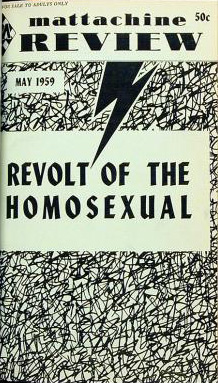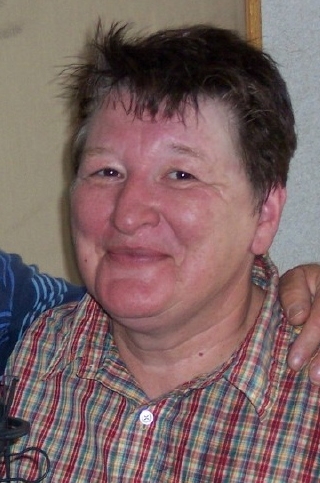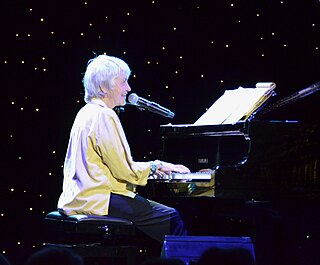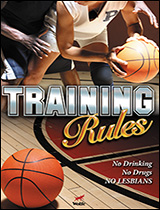
The Mattachine Society, founded in 1950, was an early national gay rights organization in the United States, preceded by several covert and open organizations, such as Chicago's Society for Human Rights. Communist and labor activist Harry Hay formed the group with a collection of male friends in Los Angeles to protect and improve the rights of gay men. Branches formed in other cities, and by 1961 the Society had splintered into regional groups.

Hothead Paisan: Homicidal Lesbian Terrorist is an alternative comic written and drawn by Diane DiMassa published 1991–1998. It features the title character generally wreaking violent vengeance on male oppressors. Recurring characters include Hothead's cat Chicken, her wise mystical friend Roz, a talking lamp, and her lover Daphne.

Curve is a global lesbian media project. It covers news, politics, social issues, and includes celebrity interviews and stories on entertainment, pop culture, style, and travel.

Holly Near is an American singer-songwriter, actress, teacher, and activist.

Ferron Foisy, who has mostly been known professionally as Ferron is a Canadian-born singer-songwriter and poet. In addition to gaining fame as one of Canada's most respected songwriters, Ferron, who is openly lesbian, became one of the earliest and most influential lyrical songwriters of the women's music circuit, and an important influence on later musicians such as Ani DiFranco, Mary Gauthier and the Indigo Girls. From the mid-eighties on, Ferron's songwriting talents have been recognized and appreciated by music critics and broader audiences, with comparisons being made to the writing talents of Van Morrison, Bob Dylan, and Leonard Cohen.
Feminist separatism is the theory that feminist opposition to patriarchy can be achieved through women's separation from men. Much of the theorizing is based in lesbian feminism.

June Elizabeth Millington is a Filipina-American guitarist, songwriter, producer, educator, and actress.

Cris Williamson is an American feminist singer-songwriter and recording artist. She was a visible lesbian political activist during an era when few who were unconnected to the lesbian community were aware of gay and lesbian issues. Williamson's music and insight have served as a catalyst for change in the creation of women-owned record companies in the 1970s. Using her musical talents, networking with other artists working in women's music, and her willingness to represent those who did not yet feel safe in speaking for themselves, Williamson is credited by many in the LGBT community for her contributions, both artistically, and politically, and continues to be a role model for a younger generation hoping to address concerns and obtain recognition for achievements specific to people who have historically been ignored.

Toshi Reagon is an American musician of folk, blues, gospel, rock and funk, as well as a composer, curator, and producer.
Women's music is a movement, chiefly in Western popular music, said to promote music "by women, for women, and about women". The genre emerged as a musical expression of the second-wave feminist movement as well as the labor, civil rights, and peace movements. The movement was started by lesbian performers such as Cris Williamson, Meg Christian and Margie Adam, African-American musicians including Linda Tillery, Mary Watkins, Gwen Avery and activists such as Bernice Johnson Reagon and her group Sweet Honey in the Rock, and peace activist Holly Near. Women's music also refers to the wider industry of women's music that goes beyond the performing artists to include studio musicians, producers, sound engineers, technicians, cover artists, distributors, promoters, and festival organizers who are also women.

The San Francisco Lesbian, Gay, Bisexual, and Transgender Pride Celebration, usually known as San Francisco Pride, is a pride parade and festival held at the end of June most years in San Francisco, California, to celebrate the lesbian, gay, bisexual, and transgender (LGBT) people and their straight allies.

The San Francisco Gay Men's Chorus (SFGMC) is the world's first openly gay chorus, one of the world's largest male choruses and the group most often credited with creating the LGBT choral movement.

Linda "Tui" Tillery is an American singer, percussionist, producer, songwriter, and music arranger. She began her professional singing career at age 19 with the Bay Area rock band The Loading Zone. She is recognized as a pioneer in Women's music, with her second solo album titled Linda Tillery released on Olivia Records in 1977. In addition to performing, she was the producer on three of Olivia's first eight albums. Within the women's music genre, she has collaborated with June Millington, Deidre McCalla, Barbara Higbie, Holly Near, Margie Adam, and others. Tillery was nominated for a Grammy Award in 1997 for Best Musical Album for Children.

Diane "Dee" Mosbacher is an American filmmaker, lesbian feminist activist, and practicing psychiatrist. In 1993, she founded Woman Vision, a nonprofit organization.

Training Rules is a 2009 American documentary co-produced and co-directed by Dee Mosbacher and Fawn Yacker. It is narrated by Diana Nyad.
Feminism has affected culture in many ways, and has famously been theorized in relation to culture by Angela McRobbie, Laura Mulvey and others. Timothy Laurie and Jessica Kean have argued that "one of [feminism's] most important innovations has been to seriously examine the ways women receive popular culture, given that so much pop culture is made by and for men." This is reflected in a variety of forms, including literature, music, film and other screen cultures.
Amber L. Hollibaugh was an American writer, filmmaker, activist and organizer concerned with working class, lesbian and feminist politics, especially around sexuality. She was a former Executive Director of Queers for Economic Justice and was Senior Activist Fellow Emerita at the Barnard Center for Research on Women. Hollibaugh proudly identified as a "lesbian sex radical, ex-hooker, incest survivor, gypsy child, poor-white-trash, high femme dyke."

Maxine "Max" Adele Feldman was an American folk singer-songwriter, comedian and pioneer of women's music. Feldman's song "Angry Atthis," first performed in May 1969 and first recorded in 1972, is considered the first openly distributed out lesbian song of what would become the women's music movement. Feldman identified as a "big loud Jewish butch lesbian."
Womyn's land is an intentional community organised by lesbian separatists to establish counter-cultural, women-centred space, without the presence of men. These lands were the result of a social movement of the same name that developed in the 1970s in the United States, Australia, New Zealand, and western Europe. Many still exist today. Womyn's land-based communities and residents are loosely networked through social media; print publications such as newsletters; Maize: A Lesbian Country Magazine; Lesbian Natural Resources, a not-for-profit organisation that offers grants and resources; and regional and local gatherings.














